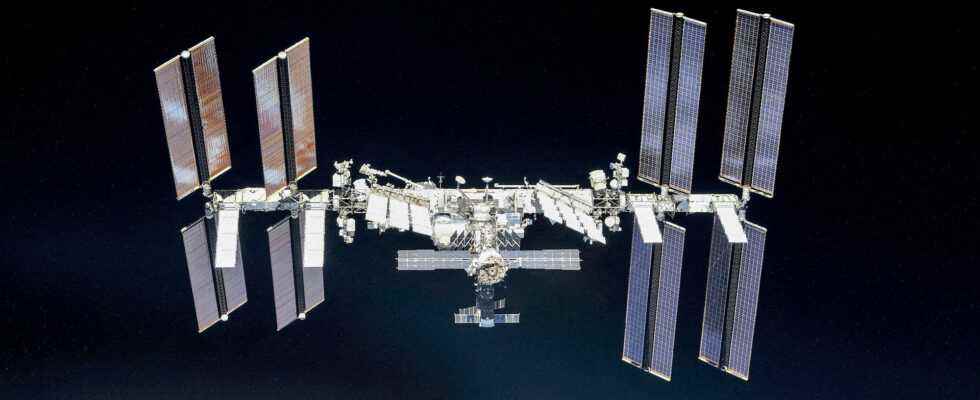The Russian space agency has announced that it will withdraw from the International Space Station (ISS) “after 2024”. Russian manned flights should then also cease.
Russia announced on Tuesday that it would stop participating in the International Space Station (ISS) “after 2024”, raising the question of its survival, amid Russian-Western tensions due to the Russian offensive in Ukraine. A model of international cooperation bringing together Europe, Japan, the United States and Russia, the ISS began to be assembled in 1998. Its retirement was planned for 2024, but NASA estimated that it could operate until in 2030. Russia plays a key role in keeping the station in orbit, but some of its ships are affected by Western sanctions due to the assault on Ukraine.
The Russian announcement of wanting to withdraw from the ISS comes ten days after the appointment at the head of the Russian Space Agency (Roscosmos) of a new boss, Yuri Borissov, who replaced Dmitri Rogozin, known for his abrasive style and outrageous nationalism. “We are no doubt going to fulfill all our obligations with regard to our partners” from the ISS, declared Mr Borissov, received at the Kremlin by Russian President Vladimir Putin, “but the decision to leave this station after 2024 was socket”. A few minutes later, NASA said it had not received “official” notification of such a withdrawal after that date.
“I think that by then we will start to create the Russian orbital station”, which will be “the main priority” of the national space program, continued Mr. Borissov. “The future of Russian manned flights must be based above all on a systemic and balanced scientific program so that each flight enriches us with knowledge in the space field”, he specified.
For Russian space analyst Vitali Egorov, this decision will mean “a break of several years for Russian manned flights”, because Russia is far from having its own infrastructure in orbit. “There won’t be a Russian orbital station in 2024, 2025 or 2026,” he told AFP: “Creating a good orbital station in three years is almost unreal. “. According to Mr. Egorov, even “with the most generous funding, it will take at least ten years”.
“Hard situation”
Until his appointment as head of Roscosmos in mid-July, Mr. Borissov, 65, held the portfolio of Deputy Prime Minister in charge of the Russian military-industrial complex, which includes the space sector. He indicated, before Mr. Putin, wanting to provide “above all the space services necessary for the Russian economy”, citing in particular navigation, communication and data transmission. So many areas where Moscow is lagging behind the Americans.
Russian-Western cooperation in the space field has been weighed down by the offensive launched by Russia since February 24 against its Ukrainian neighbor. The Western sanctions taken in the process partly affect the Russian aerospace industry and risk having effects on the ISS, some supplies of which could be disrupted. Mr. Rogozin, the previous head of Roscosmos, had already hinted that because of this Russia was going to give up on the idea of extending the life of the ISS until 2030. He had asserted in March that without the Russians, the ISS will crash on Earth because only the Russian side has the means to correct the orbit of the 500-ton structure.
If Russia has the ambition to relaunch independently in the space race, it has nevertheless been confronted for years with serious problems, in particular endemic corruption which slows down its programs and innovation.
Until the offensive against Ukraine, space cooperation had not suffered too much from Russian-Western tensions. But in recent months, several projects have borne the brunt of the war in Ukraine.
The European Space Agency (ESA) has announced the suspension of the Russian-European ExoMars mission and the search for alternatives for the launch of four other missions. For its part, Moscow has suspended the launch of OneWeb satellites, which has turned to the American company SpaceX of Elon Musk.
